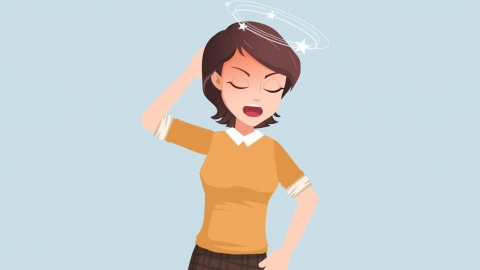What causes dizziness after waking up from sleep?
Generally, dizziness after waking up may be caused by insufficient sleep, improper sleeping posture, rising too quickly, anemia, or benign paroxysmal positional vertigo (BPPV). Symptomatic management through general treatments or medication may be necessary. If discomfort occurs, it is recommended to seek timely medical attention and undergo appropriate treatment under a physician's guidance. Detailed explanations are as follows:

1. Insufficient Sleep
Long-term late nights or poor sleep quality can lead to sleep deprivation, affecting the normal functioning of the brain. Due to insufficient rest and recovery, symptoms such as dizziness may occur upon waking, possibly accompanied by fatigue, inattention, and reduced energy levels. It is recommended to ensure adequate sleep duration, improve sleep quality, and avoid frequent late nights.
2. Improper Sleeping Posture
Poor sleeping posture can affect blood circulation and nerve conduction in the neck, leading to insufficient blood supply to the brain or dysfunction of nerve regulation, thereby causing dizziness, possibly accompanied by neck discomfort or stiffness. It is recommended to use an appropriate pillow to support the neck, which can help improve blood circulation and nerve conduction.
3. Rising Too Quickly
When the body rapidly transitions from a lying to a standing position, a temporary drop in blood pressure may occur, causing insufficient blood supply to the brain and resulting in dizziness, possibly accompanied by visual darkening, tinnitus, or a brief sensation of imbalance. It is recommended to move slowly when getting up, sitting first before gradually standing, to help prevent sudden drops in blood pressure.
4. Anemia
Poor nutrition, excessive blood loss, or impaired blood production can lead to anemia. Hemoglobin in red blood cells is responsible for transporting oxygen throughout the body; when oxygen supply is insufficient, especially during postural changes, the brain may experience dizziness due to hypoxia, possibly accompanied by fatigue, pallor, and rapid heartbeat. It is recommended to follow medical advice to take medications such as ferrous sulfate sustained-release tablets, ferrous fumarate tablets, or ammonium ferric citrate vitamin B1 syrup II for treatment.
5. Benign Paroxysmal Positional Vertigo (BPPV)
BPPV is a disorder of the inner ear's balance organs, caused by factors such as inner ear degeneration, head trauma, or ear surgery. Common symptoms include dizziness and vertigo. When body position suddenly changes, otoconia move within the semicircular canals, interfering with the normal function of the balance organs, causing dizziness, possibly accompanied by nausea, vomiting, and nystagmus (involuntary eye movement). It is recommended to follow medical instructions to use medications such as promethazine hydrochloride tablets, betahistine hydrochloride tablets, or ginkgo biloba extract tablets to alleviate symptoms.
It is recommended to maintain good ventilation in the bedroom, create a comfortable sleeping environment, improve sleep quality, and reduce the occurrence of dizziness.






